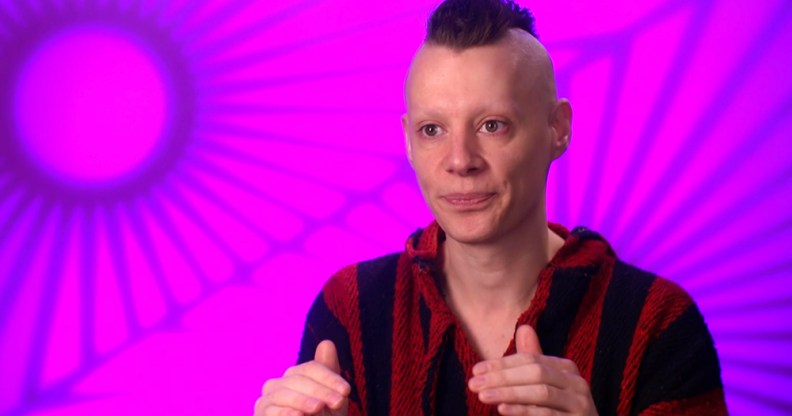Drag Race UK turns emotional as Divina De Campo reflects on life under Section 28

Divina De Campo discussing Section 28 on Drag Race UK. (BBC)
Drag Race UK took a powerful turn as the queens reflected on growing up gay and Divina De Campo spoke about living under Section 28.
For all the tongue pops, death drops and gag-worthy moments, Drag Race is often at its best when it tackles the serious issues.
Over the years we’ve watched as the American queens have bared their souls about gender identity, addiction and living with HIV, educating viewers about queer history and the issues that affect our community to this day.
Drag Race UK continued this tradition this week by reflecting on Britain’s troubled history of LGBT+ rights.
During a conversation about playground bullying, Divina recalled what it was like to be a child under Section 28.
“I got a lot of flack from pretty much everybody in the school,” she said.
“Growing up was really hard. Growing up for everybody is hard, but then you add on being gay and it’s just a whole other level, particularly for the time I grew up in.”
As she spoke about being “pushed and shoved” by her classmates who would “call you a fag and throw their drinks on you”, Divina continued: “Because of Section 28, a lot of teachers felt they couldn’t step in. It did a lot of damage to people like me.”
Section 28 banned the promotion of homosexuality.
Section 28 was a law introduced by Margaret Thatcher’s government in 1988 which banned the “promotion of homosexuality” in schools and by local authorities.
It was a horrific step backwards for the LGBT+ community, which just 21 years earlier had been liberated by the decriminalisation of male homosexuality, and was the first homophobic law to be introduced in the UK in a century.
Thatcher had first set out her opposition to LGBT+ rights in a now infamous speech at the 1987 Conservative party conference.
“Children who need to be taught to respect traditional moral values are being taught that they have an inalienable right to be gay,” she said.
“All of those children are being cheated of a sound start in life. Yes, cheated.”
Divina De Campo: Teachers were banned from acknowledging LGBT+ identities.
When Section 28 became law, it meant that councils were prohibited from funding of books, plays, leaflets, films, or other materials showing same-sex relationships, while teachers weren’t allowed to teach about gay relationships in schools.
It just erased people completely.
As Divina De Campo explained on Drag Race UK: “For most teachers, that meant [homosexuality] could not even be spoke about.
“It just erased people completely. There was no discussion around it, so you’d have no understanding as a gay person that there can be a different way of living.”
LGBT+ schoolchildren living under Section 28 had no protection from bullying and, for the most part, no real concept of what it could be like to live as their authentic selves.
LGBT+ community rallied against Section 28.
On their behalf, the UK’s queer community staged countless protests against the legislation.
When the clause was passed in the House of Lords on February 2, 1988, a group of lesbian protestors abseiled into the chamber.
Lesbians activists took further action on May 23, the evening before Section 28 came into force, storming the BBC News Studio midway through the Six O’Clock News.
The following day the charity Stonewall was formed in direct response to the legislation. Actor Ian McKellen, who had come out as gay earlier that year, prompted by the government’s actions, was a founding member and a leading voice in the fight against Section 28.
Protests continued throughout the 90s, but the legislation remained in place until the turn of the millennium.
Tony Blair’s government attempted to change the law in 2000, but its attempts were scuppered by the House of Lords. At the time Theresa May, then shadow education secretary, called it a “victory for common sense.” She would later apologise for her stance.
The Scottish Parliament successfully overturned the clause in June 2000, with Labour, the Liberal Democrats and the SNP all voting for repeal.
Three years later the issue returned to the House of Commons via a backbench amendment. Both Labour and the Tories gave their MPs a free vote on the matter, which passed 368 to 76 and was nodded through by the Lords shortly afterwards, liberating future generations of LGBT+ youth.

